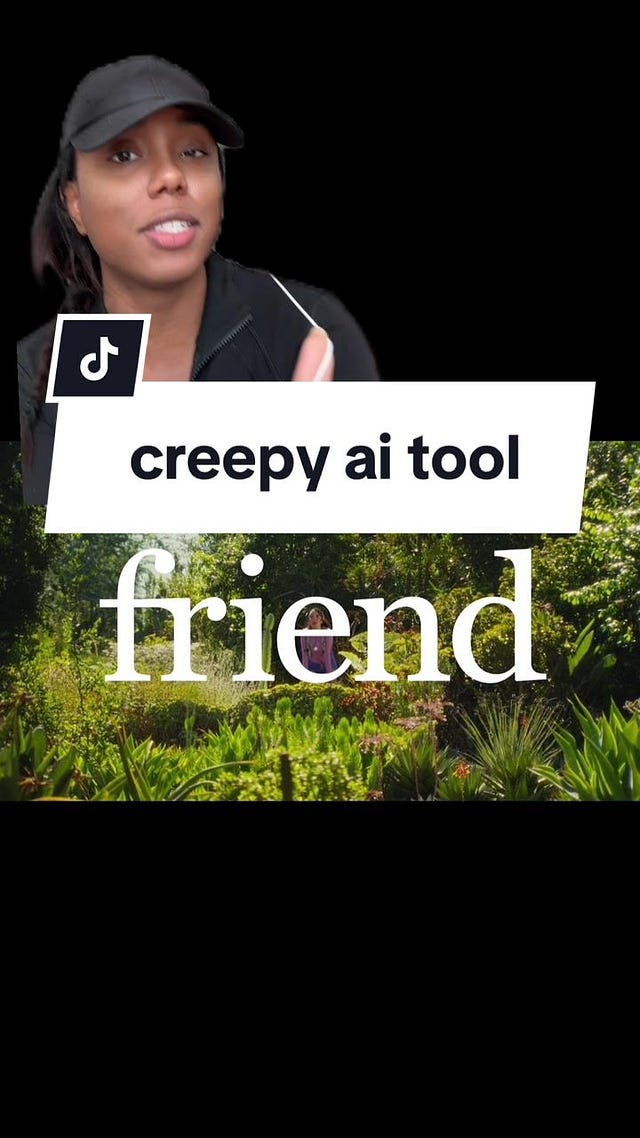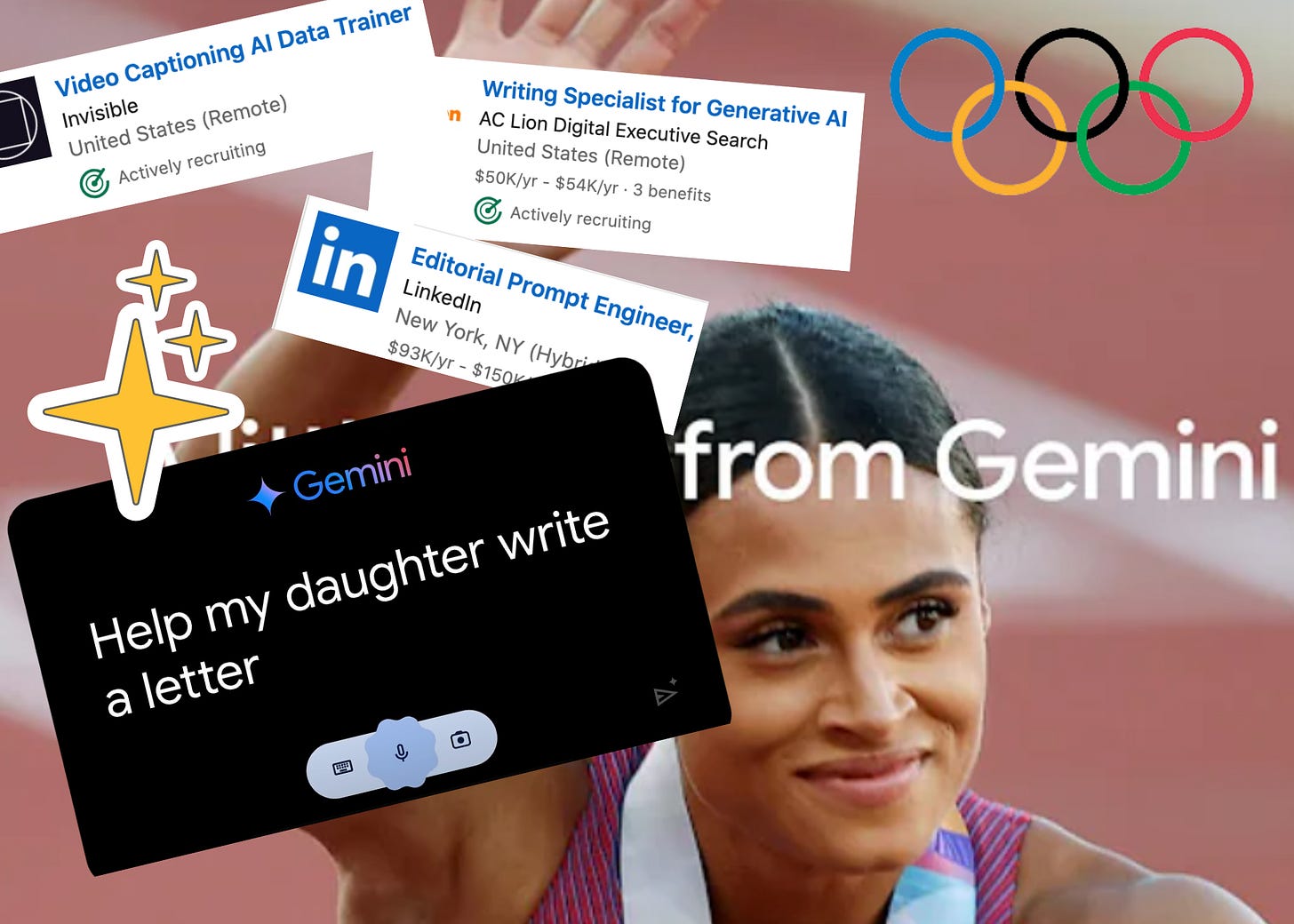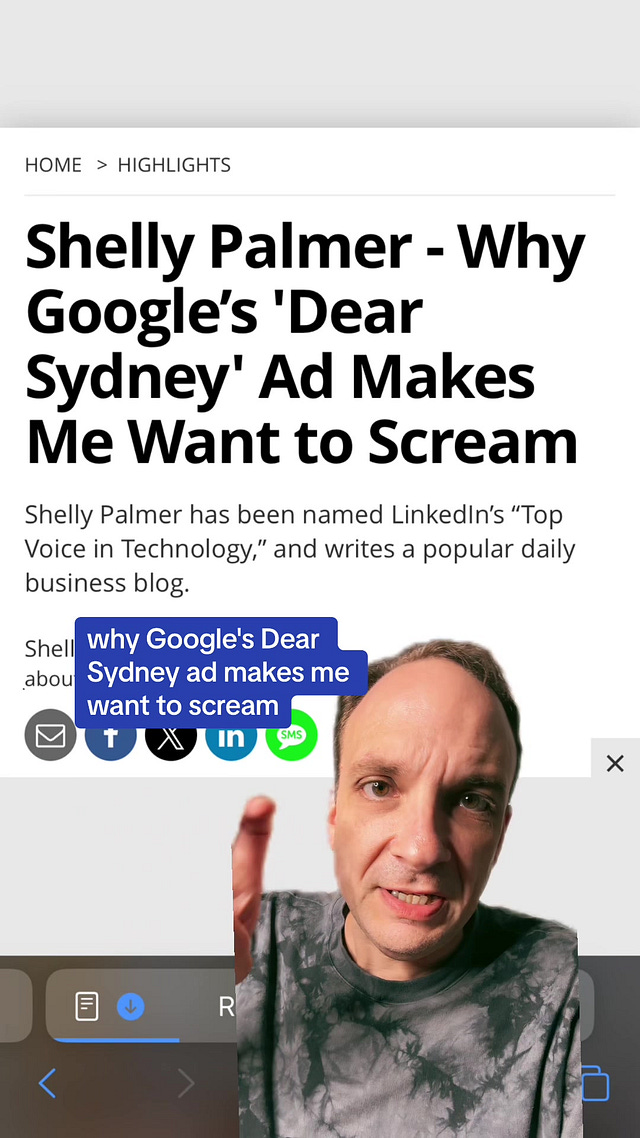AI isn’t for people
The jig is up
AI isn’t for people
I love the Olympics. I love Celine Dion. I love Marie Antoinette’s severed head singing bad metal music, red streamers pouring out of the palace behind her like the blood of the revolution. I love implied throuples on daytime network television. I love melodramatic fire play.
The Olympics are for the people, and as such they are a messy, weird, chaotic and simplistic pastiche of centuries of cultural history, plus a stressed-out creative director’s desperate bid for global renown. It is both exactly what you might expect to receive if you prompted ChatGPT to come up 30 ideas for performances that both mock and celebrate French culture through the ages, and something AI could never actually dream up.
And yet AI is everywhere at the games—or at least the Olympics broadcast. The first time I saw the now infamous Gemini commercial from Google, where a dad pulls up their gen AI to “help” his daughter write a fan letter to runner Sydney McLaughlin-Levrone, I audibly scoffed. You want “Gemini” to write a fan letter from your daughter to her hero? The very assignment any elementary school teacher would give to their students to inspire them improve their writing skills in order to express their feelings about something that excites them?
I wasn’t the only one. Caroline Mimbs Nyce at The Atlantic perfectly captures what’s so cynical and nonsensical about what she calls the “worst Olympic ad.” Plenty of bloggers have expressed their distaste, calling back to Apple’s disastrous ad that joyfully crushed a myriad artistic tools into dust with the power of a single iPad. And TechCrunch asks the nagging question, who wants to receive an AI fan letter?
What I see in the ad is big tech’s desperation to convince us that AI is for us—the ordinary plebes drooling in front of their TV screens. Somehow, Google seems especially pressed to imagine hyper specific use cases where an everyday consumer could benefit from AI tools. In a recent presentation, Google pushed it’s new Gemini photo editing app with the suggestion that you could use it to add yourself to a group photo you’re behind the camera for. As if we haven’t already found numerous ways around such a problem, like taking a selfie, or setting your camera down and hitting the timer, or—and this is going really blow the minds of the antisocial execs bringing these products to the consumer market—finding another human being to take the picture for you, creating an opportunity for a social interaction with your figurative neighbor.
Google phones will also use Gemini to transcribe your phone calls for you—all of them, including therapy sessions and heartfelt conversations between close friends, and if you tend towards catastrophic thinking, conversations about, say, leaving abusive relationships, which has to cross your mind next time you consider pouring your heart out on the phone the same way you Google “can your boss read your private messages?” every time you push send on a bitchy DM in the company Slack. And all so you can review a written summary of your 2 hours on hold with customer service.
Did Google not get the message? No one wants to talk on the phone anymore anyway.
I think it’s all a distraction from the fact that AI was never meant for ordinary people. It has always been intended as a cost-saving innovation for companies who want to spend less money on labor.
I had to consider for a moment whether I should even right this, since my current job is, you guessed it, marketing AI and its benefits for corporations. I lost my last full time job at a programmatic ad agency because Google’s deprecation of cookies (now abandoned, hahahasob) scared so many clients into pulling back on their programmatic budgets, necessitating layoffs. That agency has since pivoted to offering “fast, cheap” AI-generated ad creative to stay afloat. Back on the job market, I found most content marketing job descriptions listed ChatGPT as a key skill necessary for a job, or asked applicants to summarize hwo they planned to leverage AI in their work, should they get the gig. I was always tempted to say “Well, I used ChatGPT to write the inane mandatory cover letter (attached)” but of course that was not the answer they wanted to hear. Even worse, though, were the job listing for Writers/AI Trainers. Talk about training your replacement! (Ba dum cha)
I’m not afraid of AI exactly—it’s not good enough at what I do to fear—but I do fear what the powers that be will do with it, because diminishing quality has never discouraged a “business decision maker” from choosing the cheapest option, whatever the result.
I consider myself lucky that of all the content marketing jobs out there—98% of which are somehow involved in marketing AI—I at least have one of the honest ones. One that knows who this technology is for. One that recognizes that we should never talk about AI taking people’s jobs, either to say it can replace us, or to say that it won’t. It’s the one thing of which we must never speak. I’m lucky that my job is selling AI to the people it’s actually intended to benefit: executives. But at least the value prop I’m selling isn’t a lie. AI will automate work. It will make the work cheaper and faster. Best to just not think about who was doing it before, and what might happen to them next.
And best not to think about Sydney’s biggest fan, and whether or not she ever learns to write a letter to someone she loves.

 Tiktok failed to load.
Tiktok failed to load.Enable 3rd party cookies or use another browser
Recommendations
Lisbonata’s Pastéis de Nata in every flavor, if you can get to Fort Greene, Williamsburg, Greenpoint or Prospect Heights on Farmer’s Market day. (I think they also delvier if you can’t.)
Glynnis MacNicol’s I’m Mostly Here to Enjoy Myself. Think of it as the anti-Eat Pray Love.
Geraldine DeRuiter’s If You Can’t Take the Heat, a collection of essays about food and dining, including her viral takedown of a Michelin-starred restaurant called Bros. Come for the takedowns, stay for her essay on the history of beef stroganoff and what she does and does not know about her father, the spy.
Red Hook Lobster Pound’s Rockaway Beach outpost at Beach 97th, an establishment that begs the question: is this a perfect lobster roll or is this just a lobster roll that’s also at the beach? And does the difference matter?




